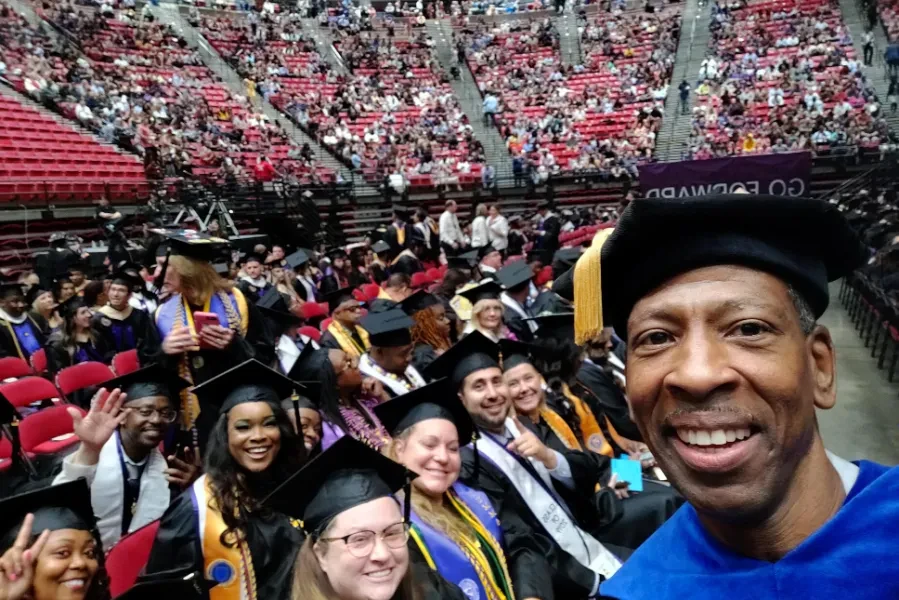When NASA awarded a young Dr. Newton H. Miller, II an engineering scholarship to the University of Pennsylvania, he did what many promising students do when they get to college. He partied.
Unfortunately, his social life took a bit too much precedence over his studies, and two years in, his GPA showed it.
“I was afraid to tell my dad I lost my scholarship, so I joined the Marines,” says Dr. Miller.
Born and raised in Philadelphia, Pennsylvania Dr. Miller recalls his parents emphasizing the value of a good education in their home.
“My dad would always say to me, ‘Once you stop learning, you start dying,’” Dr. Miller remembers. “I didn’t like school, but I loved learning. I didn’t like the bureaucracy, the set-up —and I still don’t — but I loved education.”
It was during his stint in the U.S. Marine Corps when he learned the benefits of discipline, and it didn’t take long. Upon completing boot camp, Dr. Miller was chosen as the platoon “Honor Man,” the recruit who best represented the highest traditions of the Marine Corps.
When faced with challenges today, Dr. Miller remembers that achievement.
“It taught me that if I apply the discipline of good character, determination, and a work ethic to be the best human being that I can possibly be, then I am well on my way to accomplishing whatever it is I set out to do,” he says.
After one tour with the Marines, he returned to his home city and began working in the School District of Philadelphia.
“I was good at math and science, and they needed Black males as a good presence in the classroom,” says Dr. Miller. “I was just going to do that temporarily while I worked on my master’s degree to get into engineering.”
However, once he got into the classroom and began interacting with the students, Dr. Miller realized he had found his purpose.
“I saw those students, saw what they needed, and I saw I was able to give that to them, and knew that’s where I belonged.”
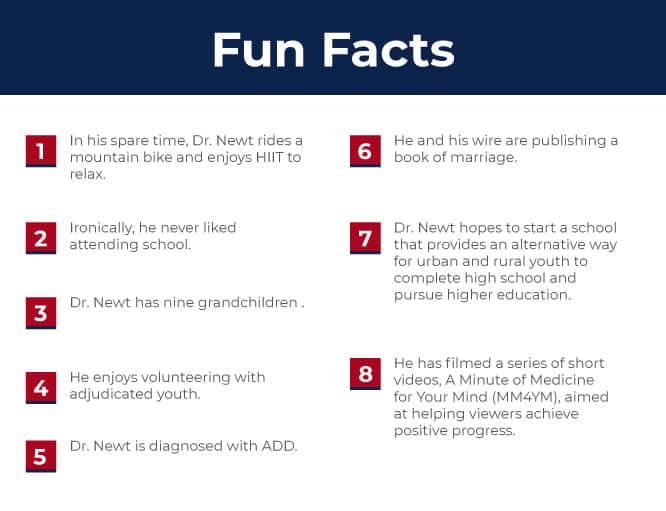
Coming from a lower-income urban environment himself in his youth, Dr. Miller connected with his students on a level he hadn’t often felt from teachers during his own school years.
“When I got in the classroom, I was able to be who I was, and I matched the students, and the students matched me, and I could see right away where that experience liberated them,” he recalls. “They would soak up that math and fall into it. I could see their self-esteem, I could see them feel good about themselves, and I just wondered what would have happened if I had more teachers like that when I was younger.”
Once he understood that mentoring and education were his true callings, Dr. Miller began to tackle the college studies he needed to become a leader in the field, earning a BA in mathematics, a Master of Education in Educational Leadership, a Master of Science in Mathematics, and his Doctor of Philosophy in Education.
“A lot of the work that I have done, I’ve worked hard, not necessarily for me, but so that I can get in the door — get in the room — so I can hold the door open for someone else,” explains Dr. Miller.
As a passionate educator dedicated to helping others succeed, Dr. Miller has words of wisdom for students like himself who may not initially feel too interested in school. “Trust the process. Just trust that process,” he says. “You know you have to do it. Finish it. Walk it through. If you work now, you can play later.”
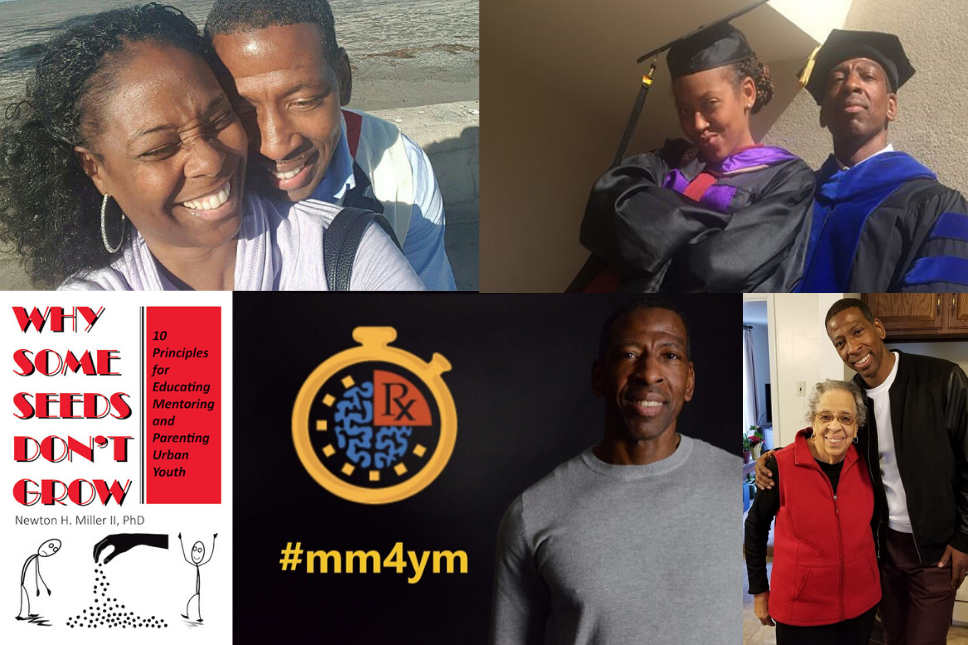
Getting to Know Dr. Miller
Today, Dr. Miller, who also goes by Dr. Newt, is the program lead for the Master of Arts in Education at the University of Arizona Global Campus (UAGC), teaches an education studies program, and is heavily involved with diversity and equity initiatives, such as Turn the Tide. He’s also been hard at work creating UAGC’s teacher preparation program.
“We built it from scratch, we wrote the curriculum, we got the license from the state, we’re working on the federal things, and actually have produced a couple of certified teachers.* We’re working on scaling that now,” explains Dr. Newt.
After some time spent living in San Diego, Dr. Newt and his family have gotten back to his roots in Philadelphia. When not in the virtual classroom, Dr. Newt often can be found filming one of his more than 200 YouTube channel videos, volunteering, writing, speaking at events, and proudly cheering on the accomplishments of his adult children. “Just to see the things they’re doing with their lives right now, which are five times further along than my life was at their age, is something to sit back and smile and be proud about,” he says with a grin.
In the following interview, he reflects on his journey as an educator and offers insights from his book, "Why Some Seeds Don’t Grow: 10 Principles for Parenting, Educating, and Mentoring Urban Youth."
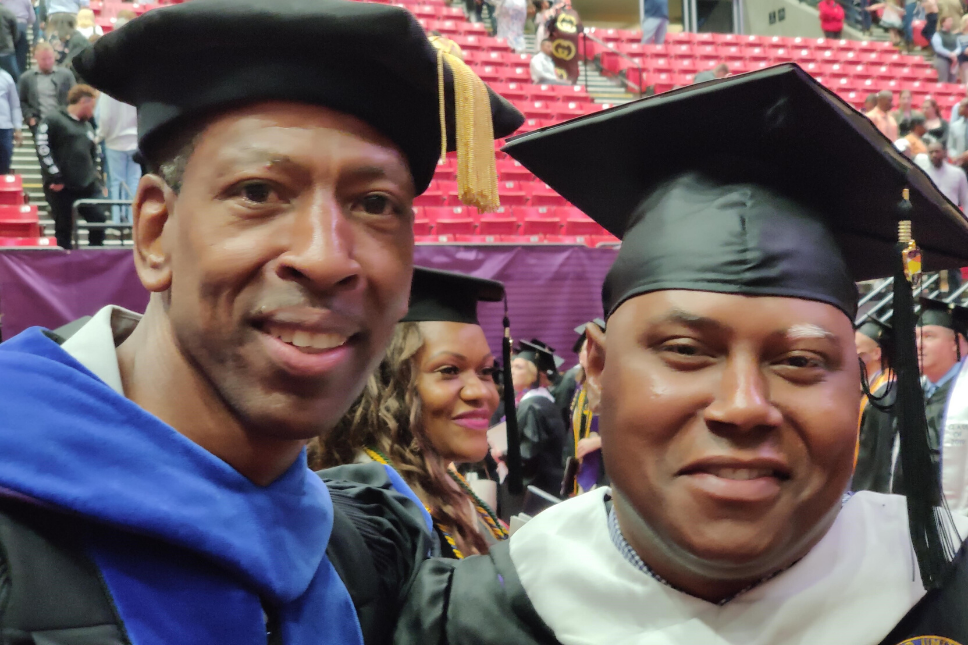
Dr. Newt, left, celebrates with a student at a commencement ceremony.
Global Campus: What do you consider to be your greatest strength as an educator?
Dr. Newt: My greatest strength is the ability to create a safe learning environment for all students by leveling the playing field academically. I work to translate concepts into normal everyday language so everyone in the class can grasp those concepts. In doing so, everyone is more willing to participate in the teaching and learning process. As a result of increased, authentic participation, critical thinking and problem-solving skills are engaged and academic achievement is increased.
Global Campus: What most excites you about your role at the UAGC?
Dr. Newt: I am most excited that I get to walk alongside my students for this portion of their educational journey. I count it a privilege to be able to influence them and impact their lives utilizing education as a way to affect positive change.
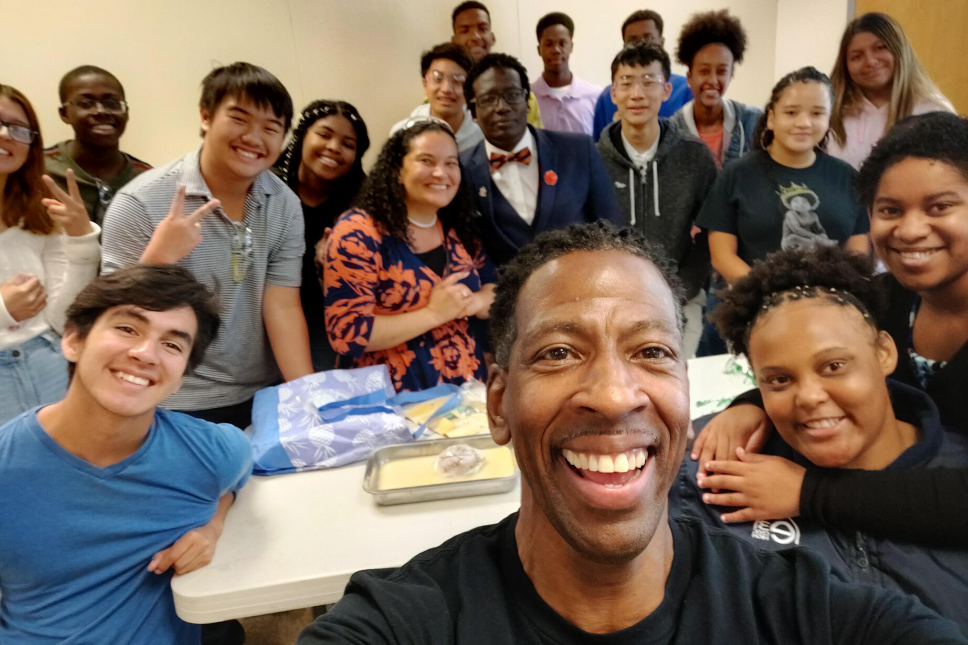
Dr. Newt, left, takes a selfie with some youth students.
Global Campus: How has working as an online educator shaped your teaching approach?
Dr. Newt: In the online model, there’s not a whole lot of wiggle room as far as content is concerned. So, at first that was difficult for me on the academic side (and my personal side). But I quickly adjusted, and what I learned — because I was always taught to look for the victory — I learned how to communicate better. I had to become very specific with my words. I learned quickly, build the tools before students get there, ask the questions before they get there, have the solutions before they even know it’s a problem.
I think what it’s done, it’s made me a much better teacher, a much better educator in every area, not just this content, but dealing with my grandkids and dealing with young men that I may mentor. Teaching online has made me way more intentional and specific in what I’m doing.
Global Campus: What inspired you to write your latest book?
Dr. Newt: As a K–12 teacher and administrator in urban school districts, I noticed that one of the biggest reasons that urban youth were not excelling in school was the culture gap between them and their educators. Most of my work as an administrator in the K–12 arena centered on building bridges between cultures so teachers could be more effective and students more receptive.
I felt it was appropriate to share the philosophies that drove my actions that led to achieving positive results in the schools in which I served. I wrote the book as a metaphor where students were seeds and educators, mentors, and parents were those responsible for sowing, nurturing, and growing those seeds so that they can produce a plenteous harvest. Specific seeds require specific needs.
My hope is that the imagery of the metaphor provokes readers to think introspectively about their methodologies and approaches to become more consciously competent about what is effective in motivating, nurturing, and growing urban youth.
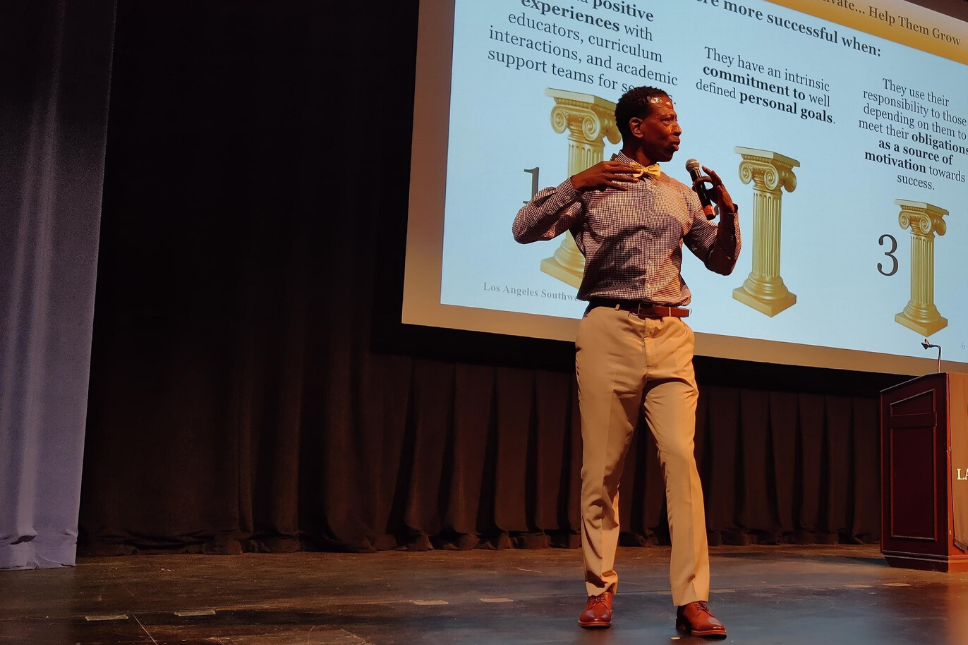
Dr. Newt delivers a presentation on education.
Global Campus: What is one of the biggest challenges today’s urban students face? If you could give their parents, teachers, and mentors one piece of advice, what would it be?
Dr. Newt: Very often, urban youth are encouraged to assimilate to a culture, a mold, or some picture of what is acceptable, and not encouraged to get in touch with their own identity, strengths, and purpose. This often leads to urban youth finding a place to fit in that doesn’t match who they are, what they are, or why they are. Thus, they’re not operating in their purpose and very often feel unfulfilled. The outward manifestation of unfulfillment can be anger, frustration, or withdrawal.
As parents, teachers, and mentors of urban youth, we must be aware that there are different needs for different seeds, and that the greatest growth happens together. Although we understand that there are different needs for different seeds, we must not be afraid to admit that we don’t always know what those needs are, be willing to learn what those needs are, and most importantly, how to provide them. We don’t always have to be an expert at what our seeds require to reach their potential. But we do have to be an expert at helping them find out how to press forward to their goals.
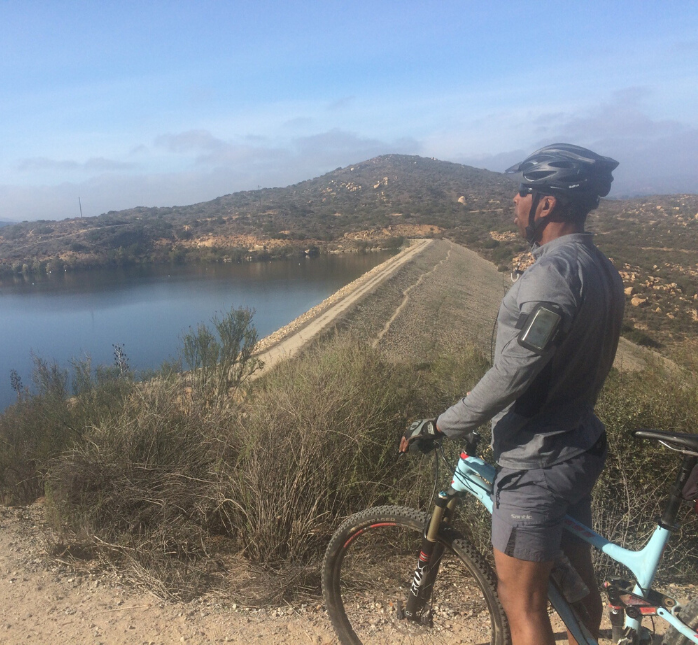
Dr. Newt stays healthy and relaxed by biking and doing HIIT workouts.
Global Campus: For many students, 2020 was an exceptionally challenging year. What type of lessons did you personally learn from such a difficult year?
Dr. Newt: What was confirmed in me through 2020 is that everything must change. Time and change are the two things that are going to happen no matter what. Time is going to keep on ticking, and something is going to change. Right? And I cannot control time and I cannot control change. But what I do with myself, how I manage myself, the things I do with that time, and preparing, negotiating, and navigating that change, that determines the outcome on the other side. What I can control is how I’m open, honest, and willing during those events so I can prepare better on the other side. Finally, I’ve lived long enough to know that storm clouds don’t come to stay, they come to pass. Above those storm clouds, the sun is still shining. All I have to do is wait for those clouds to pass, and I get to see the sun again.
--
